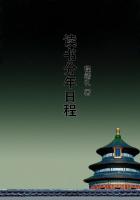At the moment when this little private council ended, Cardinal de Tournon announced to the queen the arrival of the emissaries sent to Calvin. Admiral Coligny accompanied the party in order that his presence might ensure them due respect at the Louvre. The queen gathered the formidable phalanx of her maids of honor about her, and passed into the reception hall, built by her husband, which no longer exists in the Louvre of to-day.
At the period of which we write the staircase of the Louvre occupied the clock tower. Catherine's apartments were in the old buildings which still exist in the court of the Musee. The present staircase of the museum was built in what was formerly the /salle des ballets/. The ballet of those days was a sort of dramatic entertainment performed by the whole court.
Revolutionary passions gave rise to a most laughable error about Charles IX., in connection with the Louvre. During the Revolution hostile opinions as to this king, whose real character was masked, made a monster of him. Joseph Cheniers tragedy was written under the influence of certain words scratched on the window of the projecting wing of the Louvre, looking toward the quay. The words were as follows: "It was from this window that Charles IX., of execrable memory, fired upon French citizens." It is well to inform future historians and all sensible persons that this portion of the Louvre--called to-day the old Louvre--which projects upon the quay and is connected with the Louvre by the room called the Apollo gallery (while the great halls of the Museum connect the Louvre with the Tuileries)did not exist in the time of Charles IX. The greater part of the space where the frontage on the quay now stands, and where the Garden of the Infanta is laid out, was then occupied by the hotel de Bourbon, which belonged to and was the residence of the house of Navarre. It was absolutely impossible, therefore, for Charles IX. to fire from the Louvre of Henri II. upon a boat full of Huguenots crossing the river, although /at the present time/ the Seine can be seen from its windows.
Even if learned men and libraries did not possess maps of the Louvre made in the time of Charles IX., on which its then position is clearly indicated, the building itself refutes the error. All the kings who co-operated in the work of erecting this enormous mass of buildings never failed to put their initials or some special monogram on the parts they had severally built. Now the part we speak of, the venerable and now blackened wing of the Louvre, projecting on the quay and overlooking the garden of the Infanta, bears the monograms of Henri III. and Henri IV., which are totally different from that of Henri II., who invariably joined his H to the two C's of Catherine, forming a D,--which, by the bye, has constantly deceived superficial persons into fancying that the king put the initial of his mistress, Diane, on great public buildings. Henri IV. united the Louvre with his own hotel de Bourbon, its garden and dependencies. He was the first to think of connecting Catherine de' Medici's palace of the Tuileries with the Louvre by his unfinished galleries, the precious sculptures of which have been so cruelly neglected. Even if the map of Paris, and the monograms of Henri III. and Henri IV. did not exist, the difference of architecture is refutation enough to the calumny. The vermiculated stone copings of the hotel de la Force mark the transition between what is called the architecture of the Renaissance and that of Henri III., Henri IV., and Louis XIII. This archaeological digression (continuing the sketches of old Paris with which we began this history) enables us to picture to our minds the then appearance of this other corner of the old city, of which nothing now remains but Henri IV.'s addition to the Louvre, with its admirable bas-reliefs, now being rapidly annihilated.
When the court heard that the queen was about to give an audience to Theodore de Beze and Chaudieu, presented by Admiral Coligny, all the courtiers who had the right of entrance to the reception hall, hastened thither to witness the interview. It was about six o'clock in the evening; Coligny had just supped, and was using a toothpick as he came up the staircase of the Louvre between the two Reformers. The practice of using a toothpick was so inveterate a habit with the admiral that he was seen to do it on the battle-field while planning a retreat. "Distrust the admiral's toothpick, the /No/ of the Connetable, and Catherine's /Yes/," was a court proverb of that day.
After the Saint-Bartholomew the populace made a horrible jest on the body of Coligny, which hung for three days at Montfaucon, by putting a grotesque toothpick into his mouth. History has recorded this atrocious levity. So petty an act done in the midst of that great catastrophe pictures the Parisian populace, which deserves the sarcastic jibe of Boileau: "Frenchmen, born /malin/, created the guillotine." The Parisian of all time cracks jokes and makes lampoons before, during, and after the most horrible revolutions.
Theodore de Beze wore the dress of a courtier, black silk stockings, low shoes with straps across the instep, tight breeches, a black silk doublet with slashed sleeves, and a small black velvet mantle, over which lay an elegant white fluted ruff. His beard was trimmed to a moustache and /virgule/ (now called imperial) and he carried a sword at his side and a cane in his hand. Whosoever knows the galleries of Versailles or the collections of Odieuvre, knows also his round, almost jovial face and lively eyes, surmounted by the broad forehead which characterized the writers and poets of that day. De Beze had, what served him admirably, an agreeable air and manner. In this he was a great contrast to Coligny, of austere countenance, and to the sour, bilious Chaudieu, who chose to wear on this occasion the robe and bands of a Calvinist minister.















